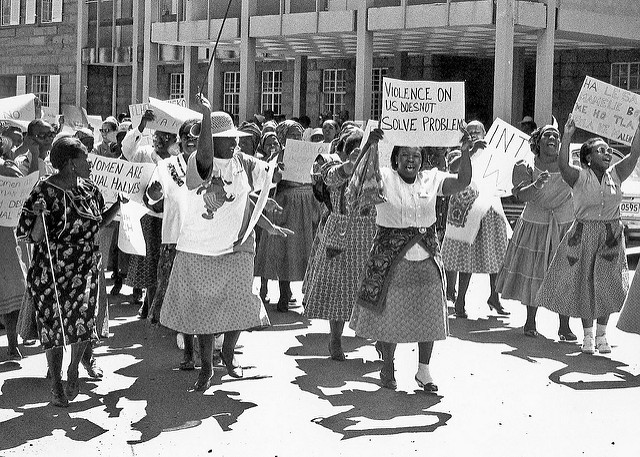
Although 23 years have passed since South Africa officially broke the chains of racial oppression, in many ways the nation is still deeply divided along racial borders.
Minority white rule and formal apartheid ended in South Africa in 1994, due to decades of sustained effort on the part of a myriad of social protest movements, organizations, and coalitions.
Consequently, all non-white citizens were granted basic rights and freedoms by ending the legal system that racially separated all South Africans. These categories limited social contact between the races, dictated where non-white citizens could reside, be employed, use public transportation, get an education, and receive health care. They restricted non-white property ownership and voting rights.
However, reconstruction and development had to encompass more than the mere creation of jobs or building of houses. As newly-elected president Nelson Mandela declared in September, 1994, “It means the fundamental restructuring of society as a whole, including relations at the work-place.”
Although gradual improvements are being made, South Africa still has plenty of social and economic hurdles to overcome before greater economic equality will be a reality that allows for the growth of meaningful and fulfilling positive liberties for all its citizens.
Founded in 1912, the African National Congress (ANC) has been in power since the election of Nelson Mandela that coincided with the formal end of apartheid in 1994. Current President Jacob Zuma belongs to the ANC party, whose official agenda is called the National Democratic Revolution.
Zuma has launched South Africa into crisis mode.
According to author Mzukisi Qob, “Currently, the ANC is deeply fractured and wounded. It has not been a cohesive force for some time. However, the anti-Zuma bandwagon is likely to grow in the run-up to the ANC’s policy conference and beyond.”
Despite a significant increase in economic growth since 1994, South Africa’s high unemployment rate has remained dismal. The slow pace of employment generation and job creation are most likely the result of ineffective labor market regulations, particularly those that hinder small businesses or create implicit costs for firms. Also at fault are chronic skill deficiencies among the workforce, coupled with the mismatched supply of and demand for skilled workers.
Unemployment is concentrated among historically disadvantaged groups and is higher among the rural, female, uneducated, and young segments of the population. Significant changes in labor regulations, along with strategic efforts to address the dearth of higher-quality education and development of skills, must be implemented in order to facilitate a stronger employment performance in the coming years.
Apartheid has officially ended, many elements of the old regime continue to function, although hidden behind the scenes, as is proven by the continued massive inequality in income and employment between white and non-white South African citizens. Economic improvements have been documented in post-apartheid South Africa, yet unemployment and poverty continue to be major problems in non-white society. Blacks make up nearly 80 percent of the population.
South African non-white women have especially difficult obstacles to surpass in regards to securing the positive liberties necessary to find viable employment. On a positive note, social and economic empowerment has empowered some women to become more independent and seek innovative ways to earn a steady income through both employment in the formal sector and entrepreneurial efforts to create and organize community-based business initiatives.
Due to gender-based discrimination, Black South African women have to deal, not only with steeper economic and employment challenges than those faced by their male counterparts, but they are also expected to fulfill familial responsibilities such as child-rearing and domestic responsibilities.
Women in South African society are expected to have multiple children and are ostracized if they remain childless, whether by choice or due to infertility. Furthermore, women who work outside the home face higher rates of domestic abuse and communal shaming.
The South African Labor movement is currently in a state of upheaval and transition because South Africa’s working class activists are acting collectively to hold government leaders accountable. They are demanding basic human rights to safe housing, portable water, and access to electricity.
A new generation of courageous and persistent activists are working to challenge the moral order of the government and thus, expose the whole edifice of neoliberal capitalism.
In the words of the great Nelson Mandela, “The strength of organised labour depends on its ability to articulate and promote the interests of workers as a whole. This will also contribute immensely to the strategic task of de-racialising South African society.”
~
Author: Michelle Margaret Fajkus
Image: K. Kendall/Flickr
Editor: Lieselle Davidson
 Share on bsky
Share on bsky





Read 0 comments and reply